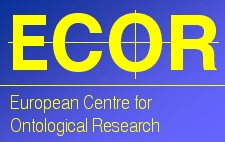Publications
| Barry Smith |
Ontology and Information Systems
Ontology as a branch of philosophy is the science of what is, of the kinds and structures of the objects,
properties and relations in every area of reality. 'Ontology' in this sense is often used in such a
way as to be synonymous with 'metaphysics'. In simple terms it seeks the classification of
entities. Each scientific field will of course have its own preferred ontology, defined by the field's
vocabulary and by the canonical formulations of its theories. Traditional (philosophical) ontologists have
tended to model themselves on these scientific ontologies, either by producing theories which are like
scientific theories but radically more general than these, or by producing theories which represent a
regimentation of scientific theories or a clarification of their foundations. Philosophical ontologists
have more recently begun to concern themselves not only with the world as this is studied by the sciences,
but also with domains of practical activity such as law, medicine, engineering, commerce. They seek to
apply the tools of philosophical ontology in order to solve problems which arise in these domains.
In the field of information processing there arises what we might call the Tower of Babel problem.
Different groups of data-gatherers have their own idiosyncratic terms and concepts in terms of which they
represent the information they receive. When the attempt is made to put this information together, methods
must be found to resolve terminological and conceptual incompatibilities. Initially, such incompatibilities
were resolved on a case-by-case basis. Gradually, however, it was realized that the provision, once and for
all, of a common backbone taxonomy of relevant entities of an application domain would provide significant
advantages over the case-by-case resolution of incompatibilities. This common backbone taxonomy is referred
to by information scientists as an 'ontology'. What is the relationship between these two uses of
this term? |
|
| Barry Smith |
Beyond Concepts: Ontology as Reality Representation
There is an assumption commonly embraced by ontological engineers, an assumption which has its roots in the
discipline of knowledge representation, to the effect that it is concepts which form the subject-matter of
ontology. The term ‘concept’ is hereby rarely precisely defined, and the intended role of
concepts within ontology is itself subject to a variety of conflicting (and sometimes intrinsically
incoherent) interpretations. It seems, however, to be widely accepted that concepts are in some sense the
products of human cognition. The present essay is devoted to the application of ontology in support of
research in the natural sciences. It defends the thesis that ontologies developed for such purposes should
be understood as having as their subject matter, not concepts, but rather the universals and particulars
which exist in reality and are captured in scientific laws. We outline the benefits of a view along these
lines by showing how it yields rigorous formal definitions of the foundational relations used in many
influential ontologies, illustrating our results |
In: Achille Varzi and Laure Vieu (eds.), Proceedings of FOIS 2004.
InternationalConference on Formal Ontology and Information Systems, Turin, 4-6 November 2004. |
Barry Smith
Pierre Grenon |
The Cornucopia of
Formal-Ontological Relations
The paper presents a new method for generating typologies of formal ontological relations. The guiding idea
is that formal relations are those sorts of relations which hold between entities which are constituents of
distinct ontologies. We provide examples of ontologies (in the spirit of Zemach’s classic “Four
Ontologies” of 1970), and show how these can be used to give a rich typology of formal relations in a
way which also throws light on the opposition between three- and four-dimensionalism. |
forthcoming in DIALECTICA |
Thomas Bittner
Maureen Donnelly
Barry Smith |
Individuals, Universals, Collections: On the Foundational Relations of Ontology
This paper provides an axiomatic formalization of a theory of foundational relations between three
categories of entities: individuals, universals, and collections. We deal with a variety of relations
between entities in these categories, including the is-a relation among universals and the part-of relation
among individuals as well as cross-category relations such as instance-of, member-of, and partition-of. We
show that an adequate understanding of the formal properties of such relations – in particular their
behavior with respect to time – is critical for formal ontology. We provide examples to support this
thesis from the domain of biomedicine. |
In: Achille Varzi and Laure Vieu (eds.), Proceedings of FOIS 2004.
InternationalConference on Formal Ontology and Information Systems, Turin, 4-6 November 2004. |
| Barry Smith |
The Logic of Biological Classification and the Foundations of Biomedical Ontology
Biomedical research is increasingly a matter of the navigation through large computerized information
resources deriving from functional genomics or from the biochemistry of disease pathways. To make such
navigation possible, controlled vocabularies are needed in terms of which data from different sources can
be unified. One of the most influential developments in this regard is the so-called Gene Ontology, which
consists of controlled vocabularies of terms used by biologists to describe cellular constituents,
biological processes and molecular functions, organized into hierarchies via the relation of class
subsumption. Here we seek to provide a rigorous account of the logic of classification that underlies GO
and similar biomedical ontologies. Drawing on Aristotle, we develop a system of axioms and definitions for
the treatment of biological classes and instances. |
Dag Westerståhl (ed.), Invited Papers from the 10th International
Conference in Logic Methodology and Philosophy of Science, Oviedo, Spain, 2003 (Elsevier-North-Holland,
2004) |
Olivier Bodenreider
Barry Smith
A. Burgun |
The Ontology-Epistemology Divide: A Case Study in Medical Terminology
Medical terminology collects and organizes the many different kinds of terms employed in the biomedical
domain. We analyze terms from several biomedical vocabularies in order to throw light on the interactions
between ontological and epistemological components of these terminologies. We identify four cases: 1) terms
containing classification criteria, 2) terms reflecting detectability, modality, uncertainty, and
vagueness, 3) terms created in order to obtain a complete partition of a given domain, and 4) terms
reflecting mere fiat boundaries. We show that epistemology-loaded terms are pervasive in biomedical
vocabularies, that the “classes” they name often do not comply with sound classification
principles, and that they are therefore likely to cause problems in the evolution and alignment of
terminologies and associated ontologies. |
In: Achille Varzi and Laure Vieu (eds.), Proceedings of FOIS 2004.
InternationalConference on Formal Ontology and Information Systems, Turin, 4-6 November 2004. |
Barry Smith
Jacob Köhler
Aanand Kumar |
On the Application of Formal
Principles to Life Science Data: A Case Study in the Gene Ontology
Formal principles governing best practices in classification and definition have for too long been
neglected in the construction of biomedical ontologies, in ways which have important negative consequences
for data integration and ontology alignment. We argue that the use of such principles in ontology
construction can serve as a valuable tool in error-detection and also in supporting reliable manual
curation. We argue also that such principles are a prerequisite for the successful application of advanced
data integration techniques such as ontology-based multi-database querying, automated ontology alignment
and ontology-based text-mining. These theses are illustrated by means of a case study of the Gene Ontology,
a project of increasing importance within the field of biomedical data integration. |
E. Rahm (ed.), Database Integration in the Life Sciences (DILS 2004), Berlin: Springer,
2004. |
| ECOR's own publications |
|
|



